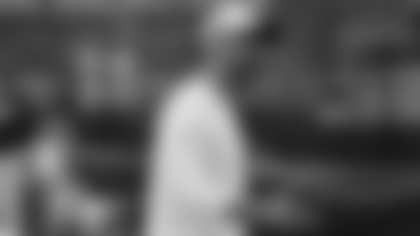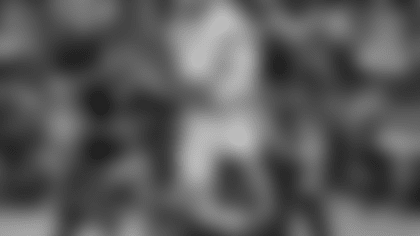Jim Hostler joined John Harbaugh's first assembled coaching staff after a stint with the San Francisco 49ers, where he was the offensive coordinator in 2007. He will coach the wide receivers in Baltimore. BaltimoreRavens.com took some time to sit down with Hostler for the start of a weekly Q&A with the coaches.
BR.com: As a former defensive back at Indiana University of Pennsylvania, what made you want to get into coaching?
Hostler: "I just always had a great respect for the guys that had coached me. We had great relationships in the past, from high school up to college. I think that really led into the decision to pursue this as a profession."
You've coached quarterbacks, linebackers, running backs, wide receivers and been a coordinator in your career. How does that diverse background help you?
"It helps tremendously. I was fortunate enough to play and work for Frank Cignetti, Sr., who has been around a lot of great coaches himself. He was the head coach as West Virginia and had a great staff there. He coached on both sides of the ball and understood, from a development standpoint, how important it is for young coaches to get experiences on both sides. He helped further that process for me when I was coaching. I coached receivers, running backs and linebackers for him. I was a GA in the secondary. I was even offensive coordinator for him. I've been pretty much everywhere I could be except the lines."
Did you know much about Cam Cameron's offense before coming to Baltimore?
"I've been fortunate enough in the league to be around both of the dominating systems. The 'West Coast' system and the basic system we'll use here. With the West Coast, I was around Paul Hackett, Mike McCarthy and Jimmy Ray, among others. In this system, one of the experiences I had in San Francisco was being around Norv [Turner]. Obviously, he carried this system from Ernie Zampese, and now some of the guys that have spun off him are Mike Martz and Cam. I was fortunate to be around Norv and learn the base fundamentals of this system. Everybody has a little variation of it, so Cam's is another variation of that system."
With the players back for the conditioning program, have you noticed the excitement in the building?
"I think there's always excitement at times like this, because it gives players and coaches a fresh start. You can look to what's ahead of you and forget about the past, and that's important. I feel there is a little bit of a change in attitude, especially with the offense. The players have been around the facility, and I can sense their excitement."
How have your meetings with Derrick Mason, Mark Clayton, Demetrius Williams and Matt Willis gone?
"Having those guys in working out has definitely been a positive for us. In our opinion, the only way you can be good at this offense is to work at it. There is a lot to it, and the work begins now, before training camp. They've been here, which is a little different than what they've done in the past. We're happy with the progress right now, but we've got a long way to go. Getting out on the field with them, doing some fundamental stuff, working on technique and laying a foundation to where we want to be has been exciting so far."
You recently came from a situation where you had young quarterbacks with a seasoned veteran in Trent Dilfer in the meeting room. Do you think there is a benefit to having that veteran presence, like with Mason here in Baltimore?
"It's always good to have players with experience. That's worth a lot in this league. It's a plus if you're doing the right things and cultivating the right atmosphere. I've coached a number of guys like that. Wayne Chrebet with the Jets was at a similar point in his career as Derrick. He was very experienced and was a good player for a long time in this league. I've been around Trent, Vinny Testaverde, Warren Moon - all veteran guys that have played for a while and still have something left in the tank to be productive. That might be in different ways than when they were younger, but that shows that they've learned the game.
"I think those guys are great to have around, especially if the other part of the room is young. Now, you have two guys that can coach and offer their knowledge. In this league, I have always felt that the players coach the players around them, and if you can utilize those guys, it's a huge advantage. If you can set your ego aside and allow those guys to help you coach the position, it is productive. Players look to the guys that have been through it, and there is a respect aspect to the situation. It takes a special person to do that."
What did you learn from your experience as an offensive coordinator?
"A lot. We had a difficult year, obviously, but went through a lot of different situations. The bottom line of this business is having the respect of the people around you that you know what you're doing and can, in turn, help the people around you. It's a unique experience, being a coordinator. Only the guys that have done it understand the responsibility and the pressure that is on the play-caller. Honestly, I took a lot away from San Francisco, both good and bad. But, it's all learning."


















